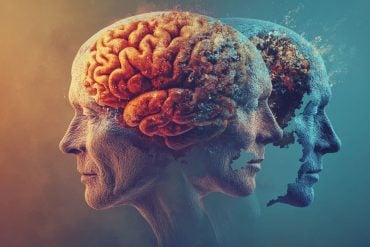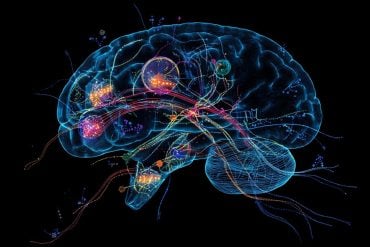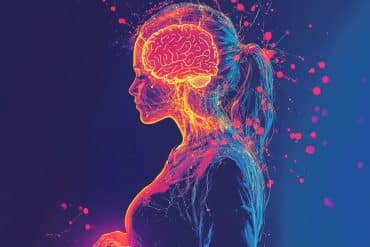Summary: A new study reveals statins, biguanides and other drugs that help treat physical conditions may have significant benefits for the treatment of bipolar disorder and schizophrenia.
Source: UCL.
Medications commonly used to combat physical health diseases, such as high blood pressure, could bring significant benefits to people with serious mental illnesses (SMI) such as schizophrenia, bipolar disorder or non-affective psychoses, according to a large cohort study led by UCL.
The study published in JAMA Psychiatry assessed the health data records of 142,691 patients with SMI in Sweden. It focused on those patients who had either been prescribed Hydroxylmethyl glutaryl coenzyme A reductase inhibitors (HMG-CoA RIs), more commonly known as statins – which are used to reduce cholesterol/heart disease, L-type calcium channel antagonists (LTCC), used to reduce high blood pressure, or biguanides (such as metformin), used to treat diabetes.
In this research, conducted with the Karolinska Institute, Sweden, and the University of Hong Kong, researchers analysed patients’ health records relating to self-harm and psychiatric hospitalisation, and assessed whether these episodes occurred during a period when patients were taking the prescribed medication or in periods when they were not.
The study found that exposure to any of the study drugs was associated with reduced rates of psychiatric hospitalisation compared with unexposed periods. Self-harm was reduced in patients with bipolar disorder and schizophrenia during exposure to all study drugs and in patients with non-affective psychosis taking L-type calcium channel antagonists.
Lead author, Dr Joseph Hayes (UCL Psychiatry), said: “Serious mental illnesses, including bipolar disorder, are associated with high levels of morbidity and are challenging to treat.
“Many widely used drugs, such as statins, have long been identified as having the potential for repurposing to benefit these disorders.
“This study is the first to use large population data sets to compare patient’s exposure to these commonly used drugs and the potential effects on people with serious mental illnesses.
“Our research provides additional evidence that exposure to HMG-CoA RIs, LTCC antagonists, and biguanides might lead to improved outcomes for individuals with SMI.
“Given these drugs are commonly used and well-known to doctors they should be further investigated as repurposed agents for psychiatric symptoms.”

All the studied drugs are known to have an effect on the central nervous system; however, the mechanism of action is not well understood and researchers believe a clearer understanding of this may lead to new drug development to benefit those with SMI.
Dr Hayes added: “All three studied drugs are globally licensed, commonly used, cheap, and relatively safe medications. They are therefore ideal candidates for repurposing.
“If substantiated, this study has considerable implications for clinical practice and drug development.”
The studied drugs effects on patients were independent of whether patients were on or off drugs aimed at treating their SMI (such as antipsychotic medication or mood stabilisers).
Funding: Wellcome Trust, Forte (Swedish Research Council), UCLH NIHR Biomedical Research Centre funded this study.
Source: Henry Killworth – UCL
Publisher: Organized by NeuroscienceNews.com.
Image Source: NeuroscienceNews.com image is in the public domain.
Original Research: Open access research for “Association of Hydroxylmethyl Glutaryl Coenzyme A Reductase Inhibitors, L-Type Calcium Channel Antagonists, and Biguanides With Rates of Psychiatric Hospitalization and Self-Harm in Individuals With Serious Mental Illness” by Joseph F. Hayes, Andreas Lundin, Susanne Wicks, Glyn Lewis, Ian C. K. Wong, David P. J. Osborn, and Christina Dalman, in JAMA Psychiatry. Published January 8 2019.
doi:10.1001/jamapsychiatry.2018.3907
[cbtabs][cbtab title=”MLA”]UCL”Statins May Help Treat Serious Mental Illness.” NeuroscienceNews. NeuroscienceNews, 9 January 2019.
<https://neurosciencenews.com/statins-mental-health-10473/>.[/cbtab][cbtab title=”APA”]UCL(2019, January 9). Statins May Help Treat Serious Mental Illness. NeuroscienceNews. Retrieved January 9, 2019 from https://neurosciencenews.com/statins-mental-health-10473/[/cbtab][cbtab title=”Chicago”]UCL”Statins May Help Treat Serious Mental Illness.” https://neurosciencenews.com/statins-mental-health-10473/ (accessed January 9, 2019).[/cbtab][/cbtabs]
Abstract
Association of Hydroxylmethyl Glutaryl Coenzyme A Reductase Inhibitors, L-Type Calcium Channel Antagonists, and Biguanides With Rates of Psychiatric Hospitalization and Self-Harm in Individuals With Serious Mental Illness
Importance
Drug repurposing is potentially cost-effective, low risk, and necessary in psychiatric drug development. The availability of large, routine data sets provides the opportunity to evaluate the potential for currently used medication to benefit people with serious mental illness (SMI).
Objective
To determine whether hydroxylmethyl glutaryl coenzyme A reductase inhibitors (HMG-CoA RIs), L-type calcium channel (LTCC) antagonists, and biguanides are associated with reduced psychiatric hospitalization and self-harm in individuals with SMI.
Design, Setting, and Participants
These within-individual cohort studies of patients with SMI compared rates of psychiatric hospitalization and self-harm during periods of exposure and nonexposure to the study drugs, with adjusting for a number of time-varying covariates. Participants included 142 691 individuals from the entire population of Sweden with a diagnosis of bipolar disorder (BPD), schizophrenia, or nonaffective psychosis (NAP) who were 15 years or older and who were treated with psychiatric medication from October 1, 2005, through December 31, 2016. Data were analyzed from April 1 through August 31, 2018.
Interventions
Treatment with HMG-CoA RIs, LTCC antagonists, or biguanides.
Main Outcomes and Measures
Psychiatric hospitalizations and self-harm admissions.
Results
Among the 142 691 eligible participants, the HMG-CoA RI exposure periods were associated with reduced rates of psychiatric hospitalization in BPD (adjusted hazard ratio [aHR], 0.86; 95% CI, 0.83-0.89; P < .001), schizophrenia (aHR, 0.75; 95% CI, 0.71-0.79; P < .001), and NAP (aHR, 0.80; 95% CI, 0.75-0.85; P < .001) and reduced self-harm rates in BPD (aHR, 0.76; 95% CI, 0.66-0.86; P < .001) and schizophrenia (aHR, 0.58; 95% CI, 0.45-0.74; P < .001). Exposure to LTCC antagonists was associated with reduced rates of psychiatric hospitalization and self-harm in subgroups with BPD (aHRs, 0.92 [95% CI, 0.88-0.96; P < .001] and 0.81 [95% CI, 0.68-0.95; P = .01], respectively), schizophrenia (aHRs, 0.80 [95% CI, 0.74-0.85; P < .001] and 0.30 [95% CI, 0.18-0.48; P < .001], respectively), and NAP (aHRs, 0.89 [95% CI, 0.83-0.96; P = .002] and 0.56 [95% CI, 0.42-0.74; P < .001], respectively). During biguanide exposure, psychiatric hospitalization rates were reduced in subgroups with BPD (aHR, 0.80; 95% CI, 0.77-0.84; P < .001), schizophrenia (aHR, 0.73; 95% CI, 0.69-0.77; P < .001), and NAP (aHR, 0.85; 95% CI, 0.79-0.92; P < .001), and self-harm was reduced in BPD (aHR, 0.73; 95% CI, 0.62-0.84; P < .001) and schizophrenia (aHR, 0.64; 95% CI, 0.48-0.85; P < .001).
Conclusions and Relevance
This study provides additional evidence that exposure to HMG-CoA RIs, LTCC antagonists, and biguanides might lead to improved outcomes for individuals with SMI. Given the well-known adverse event profiles of these agents, they should be further investigated as repurposed agents for psychiatric symptoms.






